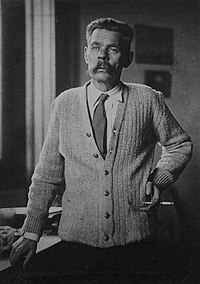People like Maxim Gorky
Maxim Gorky
Alexei Maximovich Peshkov (Russian: Алексе́й Макси́мович Пешко́в; 28 March [O.S. 16 March] 1868 – 18 June 1936), popularly known as Maxim Gorky (Russian: Макси́м Го́рький), was a Russian writer and socialist political thinker and proponent. He was nominated five times for the Nobel Prize in Literature. Before his success as an author, he travelled widely across the Russian Empire changing jobs frequently, experiences which would later influence his writing.
Gorky's most famous works are his early short stories, written in the 1890s ("Chelkash", "Old Izergil", and "Twenty-Six Men and a Girl"); plays The Philistines (1901), The Lower Depths (1902) and Children of the Sun (1905); a poem, "The Song of the Stormy Petrel" (1901); his autobiographical trilogy, My Childhood, In the World, My Universities (1913–1923); and a novel, Mother (1906). Gorky himself judged some of these works as failures, and Mother has been frequently criticized, and Gorky himself thought of Mother as one of his biggest failures. However, there have been warmer judgements of some less-known post-revolutionary works such as the novels The Artamonov Business (1925) and The Life of Klim Samgin (1925–1936); the latter is considered Gorky's masterpiece and has sometimes been viewed by critics as a modernist work. Unlike his pre-revolutionary writings (known for their "anti-psychologism") Gorky's late works differ with an ambivalent portrayal of the Russian Revolution and "unmodern interest to human psychology" (as noted by D. S. Mirsky). He had associations with fellow Russian writers Leo Tolstoy and Anton Chekhov, both mentioned by Gorky in his memoirs.









